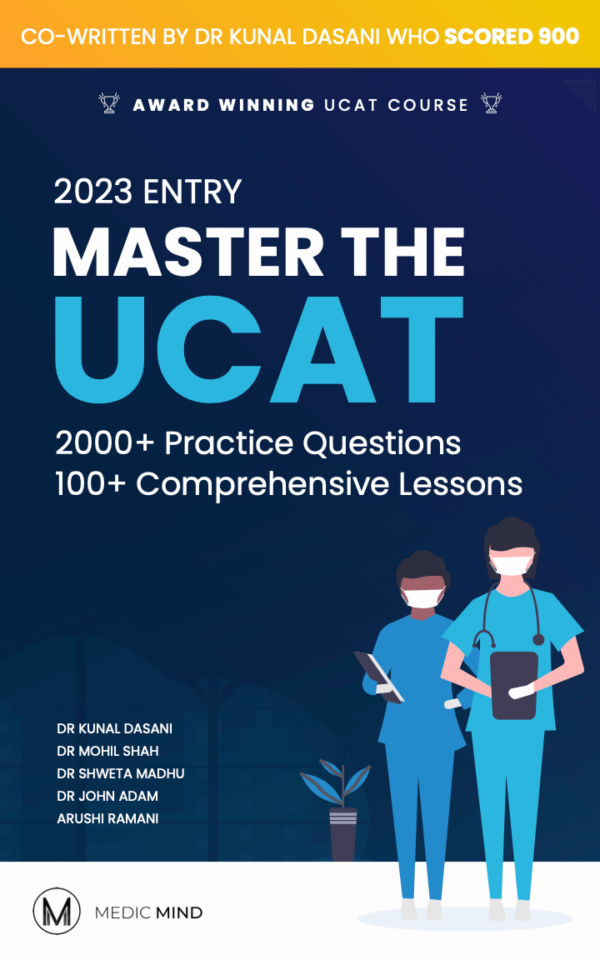Loading...

How do Universities use the UCAT?
The University Clinical Aptitude Test (UCAT) is designed to assess a student’s aptitude for a career in healthcare, and it tests a range of skills, including problem-solving, critical thinking, and decision-making. While the UCAT is an important component of the application process, universities have different approaches to interpreting UCAT scores. In this article, we will discuss how universities use UCAT scores to make admissions decisions.
First, it’s important to note that the UCAT is just one part of a student’s application. Universities will also consider a student’s academic record, personal statement, and other relevant factors. However, the UCAT score is an important piece of information that universities can use to make informed decisions about a student’s potential for success in a healthcare career.
A standardised test for all medical students
One way universities use the UCAT scores is to help identify which applicants are best suited for their healthcare programmes. The UCAT is a standardised test, meaning all applicants take the same test under the same conditions. This makes it easier for universities to compare applicants and identify those who perform well on the test. Universities will use a variety of criteria to evaluate UCAT scores, such as overall scores, section scores, and percentile rankings.

Determine eligibility for an interview
Another way universities use the UCAT scores is to determine whether an applicant is eligible for an interview. Many healthcare programmes have limited interview slots available, and universities will use the UCAT scores to help them identify which applicants are most likely to be successful in the programme.
Applicants who score well on the UCAT are more likely to be invited for an interview, allowing them to demonstrate their suitability for the programme in more detail.
Minimum UCAT score requirements
Some universities have a minimum UCAT score requirement that applicants must meet in order to be considered for admission.
For example, the University of Bristol requires applicants to score at least 2,400 points out of a maximum of 3,600 in order to be considered for admission to their medical programme.
Similarly, the University of Liverpool requires applicants to achieve a minimum score of 2,600.
Other universities, such as the University of Cambridge, do not have a minimum score requirement but use UCAT scores as part of their overall assessment of an applicant’s suitability for their program.

UCAT score weightage alongside GCSE/A-levels
Additionally, some universities will weigh UCAT scores alongside other factors, such as GCSE and A-level grades. For example, the University of Nottingham weighs UCAT scores and A-level grades equally, while the University of Glasgow gives slightly more weight to UCAT scores over A-level grades.
Other universities may have their own specific weighting system, considering a range of factors, including work experience, personal statements, and other aspects of the application.
It’s also worth noting that some universities may take a holistic approach to evaluating UCAT scores, meaning that they consider both the overall score and the individual section scores. The UCAT comprises five sections, each assessing a different skill set.
By considering overall and individual section scores, universities can better understand an applicant’s strengths and weaknesses.
The table lists universities that accept the UCAT scores for medicine and dentistry programmes. Click on the course code for further information.
| University | Click on the Course Codes below for further information | ||||||
| A20 | University of Aberdeen | A100 | A201 | ||||
| A60 | Anglia Ruskin University | A100 | |||||
| A80 | Aston University | A100 | |||||
| B32 | University of Birmingham | A100 | A200 | ||||
| B78 | University of Bristol | A100 | A108 | A206 | A208 | ||
| B84 | Brunel University London | A100 | |||||
| C15 | Cardiff University | A100 | A200 | ||||
| C30 | University of Central Lancashire | A200 tbc | |||||
| C55 | University of Chester | A101 | |||||
| D65 | University of Dundee | A100 | A104 | A200 | |||
| E14 | University of East Anglia | A100 | A104 | ||||
| E42 | Edge Hill University | A100 | A110 | ||||
| E56 | University of Edinburgh | A100 | |||||
| E84 | University of Exeter | A100 | |||||
| G28 | University of Glasgow | A100 | A200 | ||||
| H75 | Hull York Medical School | A100 | A101 | ||||
| K12 | Keele University | A100 | A104 | ||||
| K31 | Kent and Medway Medical School | A100 | |||||
| K60 | King’s College London | A100 | A101 | A102 | A202 | A205 | A206 |
| L34 | University of Leicester | A100 | A199 | ||||
| L41 | University of Liverpool | A100 | A200 | ||||
| M20 | University of Manchester | A104 | A106 | A204 | A206 | A300 | A301 |
| N21 | University of Newcastle | A100 | A101 | A206 | |||
| N84 | University of Nottingham | A100 | A10L | A108 | A18L | ||
| P60 | Plymouth University | A100 | A206 | ||||
| Q50 | Queen Mary University of London | A100 | A101 | A110 | A200 | ||
| Q75 | Queen’s University Belfast | A100 | A200 | ||||
| S18 | University of Sheffield | A100 | A101 | A200 | |||
| S27 | University of Southampton | A100 | A101 | A102 | |||
| S36 | University of St Andrews | A100 | A990 | ||||
| S49 | St George’s, University of London | A100 | BB96 | ||||
| S84 | University of Sunderland | A100 | |||||
| S85 | University of Surrey | A101 | |||||
| W20 | University of Warwick | A101 | |||||
| W80 | University of Worcester | A101 | |||||
Shortlisting for interview based on UCAT scores
Once an applicant has been invited for an interview, the UCAT scores may still be used as a factor in the admissions decision. For example, some universities may use the UCAT scores to help evaluate an applicant’s overall aptitude and potential for success in the programme.
This may be particularly relevant if there are a large number of applicants who are all well-qualified academically.
Finally, it’s important to note that UCAT scores are not the only factor that universities consider when making admissions decisions. Other factors, such as work experience, extracurricular activities, and personal statements, can also play a significant role in the admissions process. As such, it’s important for applicants to consider their application as a whole rather than focusing solely on their UCAT score.
Conclusion:
In conclusion, the UCAT is an important part of the application process for many healthcare programmes, and universities use the UCAT scores in a variety of ways to make informed admissions decisions.
While the UCAT is just one part of the application, it can help universities identify applicants best suited for their programmes and make more informed decisions about who to invite for an interview and ultimately accept into their programmes.
It’s important for applicants to research each university’s specific admissions criteria to better understand how UCAT scores will be considered as part of the application process.
FAQ
→ Q: Can I sit the UCAT more than once?
A: Candidates may only test once in any test cycle. Instances of multiple testing in the same year will be treated as misconduct and all results will be withdrawn. There is no penalty for taking the test again in subsequent years.
→ Q: How long are UCAT scores valid?
A: UCAT scores are valid for the current application cycle only. This means that if you took the test in 2022, your scores would only be valid for applications made for the 2022-2023 academic year. If you plan to apply in a subsequent year, you will need to retake the UCAT and obtain a new set of scores.
→ Q: Are UCAT scores the only factor universities consider when making admissions decisions?
A: No, UCAT scores are not the only factor universities consider when making admissions decisions. While UCAT scores are an important part of the application process, universities also consider other factors, such as academic records, personal statements, and work experience. The weight that universities give to UCAT scores will vary depending on the specific admissions criteria of each institution.
Support for the whole medical application process from UCAS application, UCAT/BMAT, personal statement, interview and more!
With over 1000 UCAT questions, mock paper walkthroughs and timing tips and advice
A unique opportunity to explore the world of healthcare through interactive simulations and real-life case studies. Run by senior physicians
Personalised private lessons, tailored to your UCAT needs





Was this article helpful?
Still got a question? Leave a comment
Leave a comment